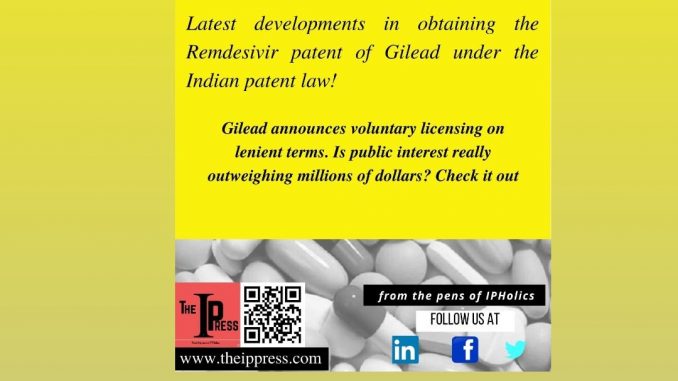
The time since the experts have suggested “Remdesivir” as a possible drug to fight against COVID-19, global debate over obtaining this drug is started. The main point of discussion is the exclusive rights obtained on this drug by Gilead around the world, which makes it politically and policy-wise difficult for the countries to produce it, however, Gilead’s authorisation (voluntary licensing) could make it easier.
The US Food and Drug Authority has approved this drug for the treatment of COVID-19 and so India recently got around 1000 doses of this drug to conduct the clinical trials. The patent (Indian patent no. 332280) would not allow the generic producers to market or manufacture this drug. However, the exception, popularly known as “the Bolar’s provision”, under Section 107A(a) of the Indian patents act (hereinafter referred to as “Act”) allows the use of this drug only for the purpose of research and experimentation and particularly for clinical trials. The generic industry is thus preparing themselves to obtain marketing approval from the drug authority.
Did you know?
The generic producer Bolar in US sought this exception as a defence to infringement. The courts rejected this defence then. Later, the use of the patented drug for clinical trials became one of the important exceptions in the patents law.
[https://en.wikipedia.org/wiki/Roche_Products,_Inc._v._Bolar_Pharmaceutical_Co.]
That said, the Act does not allow manufacturing, production or selling the patented drug patent without the patentee’s authorisation. The generic producers can obtain a compulsory license under section 84 of the Act, however, it can only be invoked after three years from the date of grant. This patent is granted recently on February 18, 2020. Hence, the generic producers cannot seek the compulsory license for Remdesivir patent under Section 84.
Seun, my classmate, asked, “What is the point of having the compulsory licensing after three years of the grant when the need could arrive anytime soon like this on-going pandemic. ” He just rightly hit the spot, what’s next? Well, the generic producers are legally deprived of this weapon directly, however, they can lobby the government to issue a compulsory license under Section 92 of the Act.
The compulsory license under Section 92 can be issued anytime after the grant of the patent if there is – a national emergency or in circumstances of extreme urgency or in case of public non-commercial use. The current situation would definitely call for the extreme urgency* (correction- thanks to the readers). Accordingly, the government is all within the rights to issue this kind of license. However, there is a high possibility that the issuance of such licenses would be criticised by the International community for misusing the flexibilities provided under the TRIPS agreement. “So, what else can we do?”, he asked. There is one way to deal with it and it is way harsher than Section 92. “No! Don’t think about Section 66 of the Act, that’s not happening”, he said. Well! the public interest outweighs everything else. So here we jump to Section 66!
On April 9th this year, the Cancer Patients Aid Association (CPAA) urged the Health Ministry to revoke the Remdesivir’s patent on the basis of public interest under Section 66 of the Act. [To access the copy click here]. They also mentioned other grounds for revocation like novelty, inventive step, etc. However, their main contention was based on the ground of public interest. The Indian government has not yet given any decision. This would again be the extremist step to obtain the drug in lieu of the public interest.
Did you know?
First time in 1994, Indian Patent Number 168950 was revoked in public interest because it was found prejudicial to farmers’ rights.
Nevertheless, the best that can be expected is a reformation in the licensing strategy of Gilead to deal with the current situation.
Voila! The timings of the latest announcement by Gilead cannot be better than this. I just received a message from my dear friend informing me about the unusual announcement, “Gilead is considering a long term licensing strategy to Indian drug manufactures over their Remdesivir’s patent.”
As covered in my previous post [To read click here], there is a requirement for collective efforts by the stakeholders, drug manufactures, patentees, government, research organisations to name a few to deal with the pandemic and this announcement is the first step towards it.
Let’s hope the announcement by Gilead is not a strategy to curb or settle the potential revocation proceedings against their patent. What do you think?
IP News!
The Indian Institute of Chemical Technology (CSIR-IICT) has synthesised the key starting materials (KSMs) for Remdesivir.
Happy patenting!!!
Indeed a very interesting study about the gilead case. Great to read you.
Thanks a lot!
The quality of your articles is what makes your THE IP PRESS stand tall.
The examination of facts and provisions is so apt. Looking forward to more article on patents. Great going.
Thanks a lot!!!
Informative and interesting article. Very well articulated.
Thanks a lot!!!
Good article.
If the Indian Government decides to revoke the patent on the grounds of public interest, they will have explain it in detail, perhaps that’s why they haven’t said anything yet.
Thanks a lot!!! Yes, I completely agree with your understanding.
Very nicely written article my dear friend. Short, crisp and very informative. Looking ahead for some more articles like this from you. Wish you best of luck.
Thanks a lot!!!
Very well articulated. Really a good read.
Thank you very much.